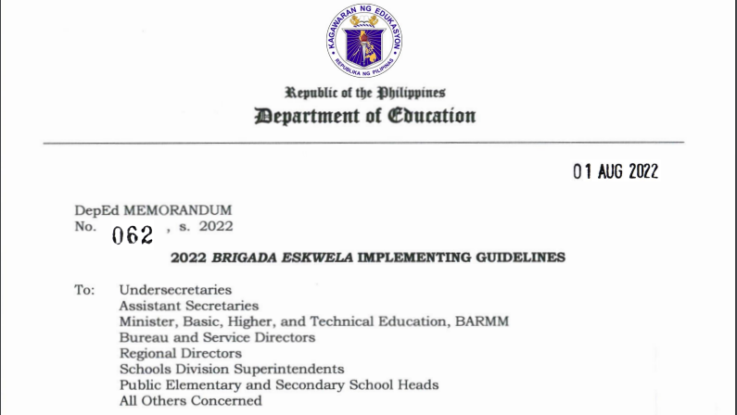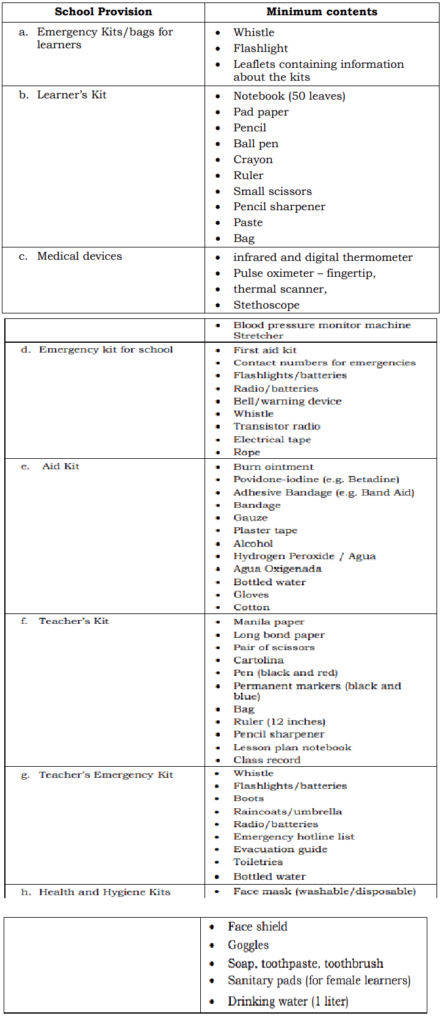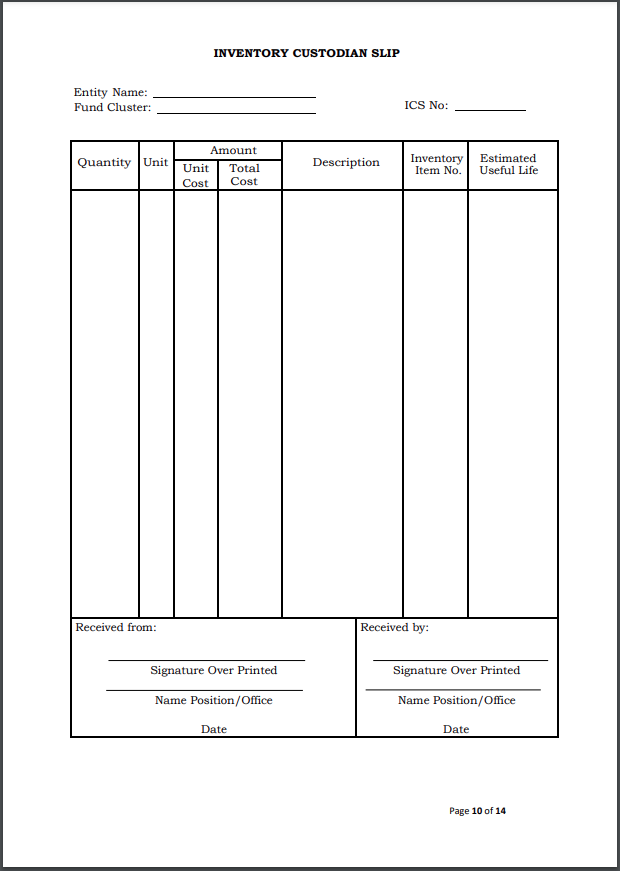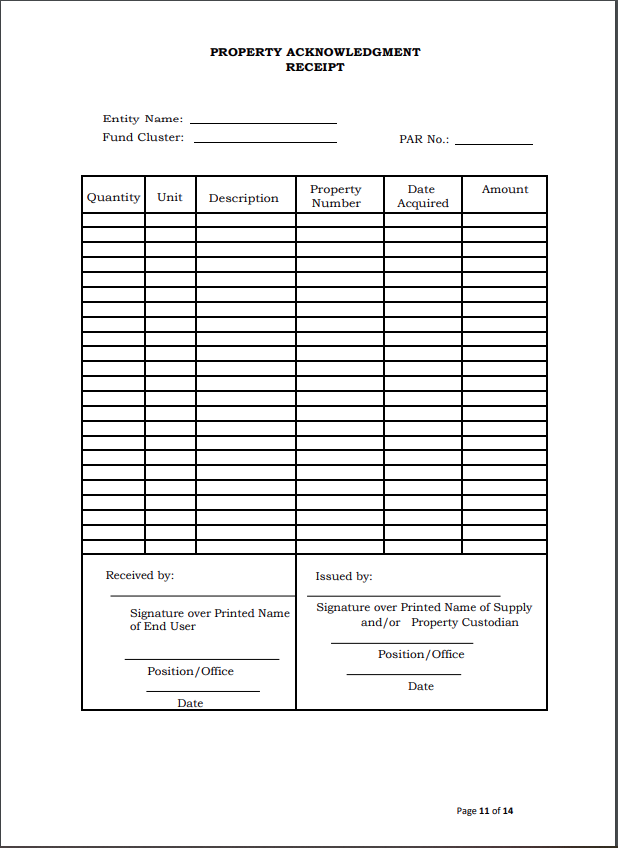
INTRODUCTION
Since 2003, Brigada Eskwela (BE) has been the prime mover of volunteerism and community involvement in the Department of Education (DepEd). This partnership program has enabled stakeholders from various sectors to intensify their support for our public elementary and secondary schools nationwide.
Full Context PDF Memoramdum – DOWNLOAD
THE BRIGADA ESKWELA PROGRAM
The BE program was institutionalized through the issuance of DO No. 24, s. 2008. The program became a regular yearly undertaking and a permanent part of the school calendar. Through the years, BE continuously evolved and purposively respond to the immediate needs of school. This year, the BE program shall define the following component to effectively support DepEd on its effort to provide quality basic education:
Brigada Eskwela sa Paghahanda – a couple of weeks’ school maintenance and minor to medium repair activities to prepare schools in time for the opening of face-to-face classes
Brigada Eskwela Plus – a contribution to the attainment of the United Nations Educational, Scientific and Cultural Organizations (UNESCO)-prescribed Education for All (EFA) goals that seek to increase learner participation and reduce dropouts (specifically addressing these issues in the secondary level) and to improve the quality of education in participating schools in order to increase student performance. Brigada Eskwela Plus focuses on the following activities:
- Community-led efforts to improve learner participation and reduce dropouts;
- Community-led efforts to improve learner performance; and
- Community-led efforts to support existing DepEd programs and projects that ensure school safety and preparedness of the school, such as the Home Learning Spaces (HLS) Program, Wash in Schools (WinS) Program, Gulayan sa Paaralan and other advocacy on health awareness.
Brigada Pagbasa (BP) – an after-school reading remediation program in response to the call of the Department to intensify advocacy for reading consistent with DepEd Memorandum No. 173, s. 2019, titled “Hamon: Bawat Bata Bumabasa (3Bs Initiatives).” In the same issuance, DepEd acknowledged that initiatives implemented to develop the learners’ reading skills are insufficient based on the results of the national assessments for learners. The BP Program aims to make every learner a reader by engaging partners and stakeholders to promote the culture of reading.
REMINDERS FOR SCHOOL HEADS (SH) IN THE IMPLEMENTATION OF THE 2022 BRIGADA ESKWELA
This year’s BE shall address the challenges and learning resource gaps for teachers and learners through strengthening partnership engagements in the local and national level. It shall complement DepEd’s efforts to ensure the delivery of quality basic education and to intensify the implementation of the BP, HLS Program and other programs supported by BE. It shall also enhance DepEd’s efforts to effectively and efficiently implement full inperson or face-to-face classes by November 2, 2022 in all public schools nationwide.
Aside from the usual activities conducted in the past BE, SHs must ensure the following among other related initiatives:
- coordinate with the local government units (LGUs) or other nongovernment organizations (NGOs) and volunteers for intensive clean up and sanitation drive such as routine cleaning and disinfecting of school buildings, classrooms, and other school facilities.
- engage education partners during BE for resources generation on
the following items in schools:- printing of COVID-19 precautionary measures as well as overall sanitation/hygiene information materials;
- printing of materials and provision of supplies for the learners, teachers and parents (i.e. bond papers, worksheets, notebooks, pad paper, ball pens, pencils, crayons, coloring materials and others);
- sanitation/hygiene materials, such as hand sanitizers, antiseptic/disinfectant alcohol, anti-bacterial or germicidal soap;
- medical devices and equipment (i.e. infrared and digital thermometer, pulse oximeter – fingertip, thermal scanner, stethoscope, blood pressure monitor machine);
- disposable face mask, surgical face mask, face tissue, face shield and washable handkerchief/towels;
- cleaning/sanitation tools, materials or disinfectant agents that may be used to disinfect the learning areas, such as spray tank, disinfectant spray or disinfecting bleach, foot bath; and
- multivitamins capsules, tablets, or syrups for both DepEd teaching and non-teaching personnel and learners.
- ensure that psychological first aid or other psychological interventions and debriefing are conducted in partnership with stakeholders during the implementation of BE.
- conduct orientation activities with teachers, partners, ParentsTeachers Associations (PTAs) and learners with special focus on transitioning to the full implementation of DepEd’s face-to-face classes on November 2, 2022. The use of computer-mediated communication strategy in conducting above-cited activities is highly encouraged.
- encourage parents on possible collaborations with the schools to provide support for the continuation of learning opportunities.
- engage parents in the promotion of the new school system. The new role and increased involvement of the parents in the learning of their children are essential to augment available resources and technology in the community.
- coordinate with the concerned DepEd units on the possible implementation of Gulayan sa Tahanan or Urban Vegetable Gardening at Home as part of BE and School-Family-Community partnerships to promote sustainable food supply at homes. SH may communicate with stakeholders on how they can support the school emergency and contingency to ensure resiliency.
- collaborate with various stakeholders to support the full implementation of face-to-face classes.
- realign and sustain the conduct of Brigada Pagbasa.
- conduct Partnership Appreciation and other school-based initiatives to recognize the efforts of various stakeholders.
- include the partnership for Wash in Schools (WinS) and Disaster
Preparedness in their Brigada Eskwela Work Plan.
- The SH must document all their efforts to implement the new way of conducting BE. All partnership initiatives and generated resources shall be reported in the DepEd Partnerships Database System (DPDS) starting August 1, 2022 to September 30, 2022.
- SHs are reminded that no Brigada Eskwela fee shall be collected from parents/guardians or solicited from other volunteers and stakeholders.
- Pursuant to DepEd Order No. 06, s. 2012 titled “Guidelines on the Adoption and Implementation of Public Health Policies on Tobacco Control and Protection against Tobacco Industry Interference,” receiving assistance or support from companies and other players in the tobacco industry for BE is not allowed.
- Pursuant to DepEd Order No. 048, s. 2018 titled “Prohibition on Electioneering and Partisan Political Activity,” the schools may not receive any forms of contribution/donations from official candidate(s) for the barangay election.
SCHOOL SAFETY AND PREPAREDNESS GUIDE
In view of the implementation of the 2022 Brigada Eskwela and the preparation of the face-to-face classes, this School Safety and Preparedness Guide consistent to DO 33, 2021 titled “Schools-Based Disaster Preparedness and Response Measures for Tropical Cyclones, Flooding and Other Weather-Related Disturbances and Calamities” shall provide guidance to schools and education partners in ensuring safety and preparedness of our learners and personnel before, during and after emergencies.
Enumerated below is a list of recommended activities that may contribute to a safer school. The SHs need to identify which among those listed below are most appropriate and important for their schools. They may also identify other measures that may add-up to this list.
A. SAFE LEARNING FACILITIES
1. Facilitate the assessment of school building structure and electrical wiring and make necessary repairs and/or upgrades to prevent unnecessary incidents.
2. Repair minor classroom damages such as broken windows, doors, blackboard, roofs and other furniture, etc.
3. Install appropriate and available fire suppression, including fire extinguishers, water source and relevant indigenous materials.
4. Ensure that corridors and pathways are unobstructed and that all sharp, protruding objects which may cause harm to learners are removed.
5. Clean and clear drainage to prevent clogging. Cover drainage canals and provide necessary warnings.
6. Cordon off and post safety signage for on-going construction, unfinished, damaged and condemned buildings.
7. Secure cabinets and drawers and ensure that heavy objects are below head level.
8. Post safety measures to be observed in laboratories, workshops, and other facilities requiring the same.
9. Prepare an evacuation/exit plan and post directional signage on every floor of the building.
10.Identify evacuation areas and classrooms that may be used as temporary shelters during disasters and emergencies.
11.Prune trees to avoid entanglement from electrical wirings and avoid potential harm to life and property.
B. SCHOOL DISASTER MANAGEMENT
1. Post a directory of emergency contact numbers of relevant government agencies and officers in various high traffic areas of the school.
2. Establish and maintain early warning mechanisms in the school.
3. Equip school with first aid kits, flashlights, megaphones, and other supplies necessary in cases of emergency. Ensure that these items are highly accessible and can be easily located.
4. Identify alternative sources and/or maintain supply of drinking water within the school.
5. Ensure that learners, teachers, and personnel have identification cards with relevant information.
6. Create database of learners with the contact details of their immediate family members/relatives/guardians.
7. Secure and safely store vital school records.
8. Coordinate with barangay officials on pedestrian safety of learners.
9. Document accidents experienced by learners and personnel within the school to improve prevention and mitigation measures.
C. RISK REDUCTION AND RESILIENCE EDUCATION
1. Identify a storage area for safekeeping of vital schools’ records, textbooks, teaching manuals, computers, and other school equipment.
References:
International Finance Corporation (no date) Disaster and Emergency Preparedness Guidance for Schools, (IFC World Bank).
Department of Education (2015 DRRM in Basic Education Framework PowerPoint presentation).
Menu of School Kits
The table below breaks down the minimum contents of each school kit:
WASH IN SCHOOLS DURING BRIGADA ESKWELA
Access to safer water, functional toilets and proper hygiene practice in schools creates the safe and conducive environment for children to optimally participate and achieve the learning outcomes. Consistent with DO 10 s. 2016 titled “Policy and Guidelines for Comprehensive Water, Sanitation and Hygiene in Schools (WinS) Program” the Brigada Eskwela supports the partnership component of WinS. Thus, the need to ensure that water, sanitation and hygiene (WASH) facilities are adequate in number and well-maintained, and the necessary hygiene and cleaning supplies are available in schools.
1. Creating a Conducive Learning Environment
With clean water supply, children are protected from water-related diseases and can practice proper hand and oral hygiene. In addition, toilets and other facilities are properly used and easily maintained. Clean and functional toilets that have privacy, proper ventilation, and are in visible, safe and accessible location ensure that children are able to relieve themselves with comfort and dignity. Moreover, adolescent girls are able to manage their menstruation effectively when toilets have water, soap and garbage bins for sanitary pads disposal. Group handwashing facilities and soap enable children to wash their hands and brush their teeth at scheduled time of the day, and thereby creating the routine for habit formation. Individual handwashing facilities with soap at strategic places such as in or nearby toilets and eating places enable children and adults, including food handlers and teachers, to wash their hands after using the toilets and before eating or handling food.
2. Developing Life-Skills and Increasing Resiliency
WinS develops life skills and contributes to the education goal of positive behavior change for young Filipinos. Through creating a safe environment and developing positive hygiene behavior, WinS contributes to reducing the vulnerabilities of children and increasing their resilience, especially at times of disaster and emergency.
Cognizant of the above, DepEd, through the Comprehensive WASH in Schools Policy (DepEd Order No. 010, s. 2016 titled “Policy and Guidelines for the Implementation of the Comprehensive WASH in Schools Program”) established standards for WASH services that need to be ensured in all schools. Invoking the National WASH in Schools Policy, DepEd Order No. 032, s. 2017 titled “Gender-Responsive Basic Education Policy”’ mandates that schools should provide women, girl-child and adolescent-friendly facilities that meet the standards for Menstrual Hygiene Management (MHM).
3. WASH in Schools (WinS) in Brigada Eskwela
The Comprehensive WASH in Schools Policy also recognizes the application of the School-Based Management (SBM) approach in improving and sustaining WinS, particularly through school planning and budgeting, partnerships and linkages. In this light, WinS strategically falls within the objectives and design of the BE Program. For the purpose of the BE, the National WinS Three Star Approach provides guidelines in the identification of the gaps in WinS and prioritization of actions to address them.
4. Global Standards on Sanitation, Hygiene
4.1. Compliance with access to safe drinking water;
4.2. Provision of sanitary pads. Schools are prepared to support girls during menstruation by providing sanitary pads;
4.3. Provision/ access to gender-segregated and functional toilets; and
4.4. Availability of handwashing facility with water and soap and enforcement of daily hygiene practices.
5. Mobilization and Provision of the following WinS Activities:
5.1. Provision of water supply, through connection with barangay water networks, construction of water pumping system, and/or installation of rainwater catchments;
5.2. Construction of additional toilets, particularly gender-segregated toilets for boys and girls;
5.3. Repair and improvement of existing toilets, including desludging, to ensure functionality, privacy, comfort and security for children, especially girls;
5.4. Construction/improvement of individual and group handwashing facilities;
5.5. Improving accessibility to water, toilets and handwashing facilities through provision of concrete footpaths, disability ramps and roofing;
5.6. Provision of rest space for menstruating girls that are private, secure and comfortable;
5.7. Improvement of drainages, cleaning of roof gutters, and elimination of stagnant water;
5.8. Provision of hygiene supplies — soap, toothpaste, toothbrush, sanitary pads, etc. —and cleaning materials;
5.9. Improvement of solid waste management, including the provision of garbage bins for waste segregation, compost pits and material recovery facilities and/or securing local garbage collection services;
5.10. Putting up hygiene messages in strategic places (toilets and eating places) to motivate proper use of toilets and handwashing at critical times, especially after using the toilet and before eating;
5.11. Orientation of parents and other stakeholders on WinS and engaging their support for developing proper WASH practices at home and the community; and
5.12. Orientation and Certification of Canteen Operators, Vendors and Food Handler.
RECORDING OF DONATED ITEMS CATEGORIZED AS PLANT, PROPERTY AND EQUIPMENT
The SHs shall ensure that all donated items classified as property, Plant and Equipment are properly recorded in the book of accounts as stipulated in DepEd Order No. 082, s. 2011 titled “Guidelines on the Proper Recording of all Donated Properties.” The documents required to support the recording in the book of accounts are as follows:
a. Inventory Custodian Slip for donated properties with value below P50,000.00; and
b. Property Acknowledgment Receipt for donated properties above P50,000.00.
CLICK HERE TO DOWNLOAD INVENTORY CUSTODIAN SLIP
CLICK HERE TO DOWNLOAD PROPERTY ACKOWLEDGEMENT RECEIPT
DOWNLOAD MOST ESSENTIAL LEARNING TEACHING MATERIALS FOR THE WHOLE SCHOOL YEAR
- All New Self-Learning Modules for Grades 1-12 in All Subjects
- Weekly Home Learning Plans 1st-4th Quarter in Complete Subjects for Grades 1-6
- Self Learning Modules for Grades 1-12 all Subjects All Quarters
- Complete daily lesson log DLL G1-6
- Complete PowerPoint Lesson Plan G1-6
- Complete Learning and Teaching Materials for Junior – Senior High
- Contextualize Lesson Plans for Kinder, Grades 1-10
- MELC’s for All Subjects
- Official Workweek Plan Templates
Be the first to be informed, Please like our Facebook Page here
Disclaimer: This post is created for information, education and dissemination purposes only, NO copyright infringement intended, for more questions and inquiries contact us at depedlps@gmail.com



Leave a Reply